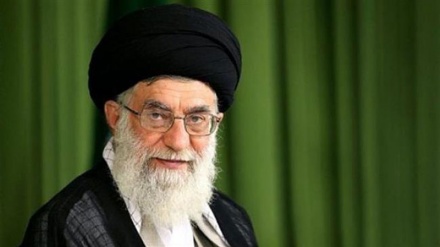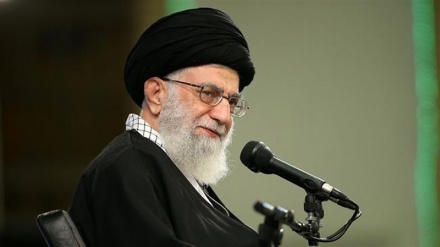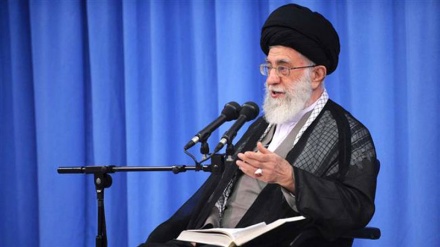In Presence of the Sun (93)
In a couple of episodes we have been dealing with the rights of women in the view of Islam with elaborations of Ayatollah Khamenei, Leader of the Islamic Revolution. In this episode, we are going to continue the discussion.
Strengthening the family unit and paying attention to the constructive role and status of woman in various aspects is among the basic demands of Islam. In view of the Islamic teachings woman is a venerated and endeared creature with legal and legitimate rights in every domain.
Ayatollah Seyyed Ali Khamenei, in numerous speeches, has tried to familiarize women and other strata with the rights of women and their lofty status in society and family.
Once he said to a gathering of young educated and cultured women, “I request you to pay close attention to what I’m going to tell you. Woman can be considered from three viewpoints so that the Islamic vision is clarified about her. First, is the role of woman as a human being in the path of spiritual and personal perfection in which there is no difference between woman and man. The second viewpoint is in the social, political, scientific and economic activities. In view of Islam the field of scientific, economic and political activity is quite open for woman. The third viewpoint is to look at woman as member of family which seems to be the most important one. My dear ones! In Islam man is not allowed to bully woman and impose her anything. For man, there have been set limited rights in family which spring from expediency and wisdom.”
If we want to get familiar with the rights of woman in Islam we can do it better through explaining the role of women in three fields. The Leader believes that, from a viewpoint a woman is a person who moves in the course of spiritual and personal perfection. As in history, there have been great women who had attained high degrees of piety and self-restraint so that the holy Qur’an has exemplified them as the role models for mankind. For instance, this holy book gives the example of the Pharaoh’s wife, Asiya, as the role model for every believer. Elsewhere in the Qur’an, we come across the account of Jesus’ mother, Lady Maryam, as the role model for all believers.
Ayatollah Khamenei elaborates on these two great women, “See from the dawn of history till the end, how many faithful, including the nobles, the righteous, the friends of God and apostles, have come and gone. When God wants to introduce an illustration, a statue and a symbol, He introduces two women: one is the Pharaoh’s wife who said to God, ‘My Lord, build me a home by You in Paradise and deliver me from Pharaoh and his deed.’ The second one, ‘And Maryam, daughter of Imran, who guarded the chastity of her womb, so We breathed into it of Our spirit. She confirmed the words of her Lord and His Books.”
The Leader raises an important point, i.e. in Islam gender is a secondary issue and it has no impact in the main course of human being toward sublimity and perfection and that man and woman are not different in this respect.
In view of the Leader another point of this ayah is that these two faithful and pious women have attained such a status owing to the role they have played in family. Asiya, the Pharaoh’s wife, was a woman whose divine nature awakened once she faced with pure truth and she was absorbed by spirituality and attaining God’s proximity. As the Leader of the Islamic Revolution says the pomp and welfare of Pharaoh’s palace couldn’t absorb Asiya though she had been from a wealthy and royal family, too. She embraced the truth of Moses’ mission and abandoned the comfort and welfare of the royal life that splendid palace had no attraction for her. She appealed God to build her a house by Him in Paradise. She preferred the heavenly home to the paltry trappings of the mortal life.
Lady Maryam, too, has been selected by God due to stepping in the path of piety, spirituality and chastity. Ayatollah Khamenei states, “It is clear that in the environment of Lady Maryam there were causes which could threaten the chastity and purity of a chaste woman and Lady Maryam has succeeded in struggling and preserving her chastity in an appropriate way.”
Based on the life of Asiya (Peace upon her) we conclude that no woman can forget Almighty God and her divine nature with the pretext of luxurious life and pompous lifestyle. Based on the life of Maryam (Peace upon her) we understand that women cannot justify immorality with the pretext of exposure to polluted and corrupt environment; rather they should resist against these dangers and preserve their chastity with reliance on God.
Tendency toward spiritual issues exists in every human being including men and women as God has created all natures inclined toward Him. This is a spiritual right of women and no man or husband can hinder a woman’s way toward spirituality.
Interestingly, God has made it easier for women to achieve spiritual degrees due to their beautiful nature. Thus, since woman has an innate penchant to doing housework and caring her husband and children God has assigned great reward for these works.
A famous hadith from the Prophet of Islam reads, “A woman’s jihad is to behave excellently with her husband.”
Proper behaviour of woman with her husband and her lovely relation with her husband is the divine demand of her. Although God has placed proper behavior with husband in the nature of woman it is a difficult job. Of course, husband is also duty bound to treat her wife with love and kindness. A hadith from the Prophet reads, “The best men are those who are best with their wives.”
Ayatollah Khamenei explains the Prophet’s hadith on the jihad of woman at home, “It means that the reward of struggle of the youth who goes to the battlefield and sacrifices his life will be granted to the woman; since this job is not less difficult than that. Behaving properly with the husband is very difficult. Dealing with the expectations, bad temperament, stronger voice, taller stature, this is difficult. Well, if a woman is able to make the home conditions warm, attractive and with comfort and tranquility, despite all these difficulties, this is a very great art. This is really a jihad. This is one of the branches of Jihad Akbar (great struggle) which is said to be the struggle against one’s self”.
RM/MG


